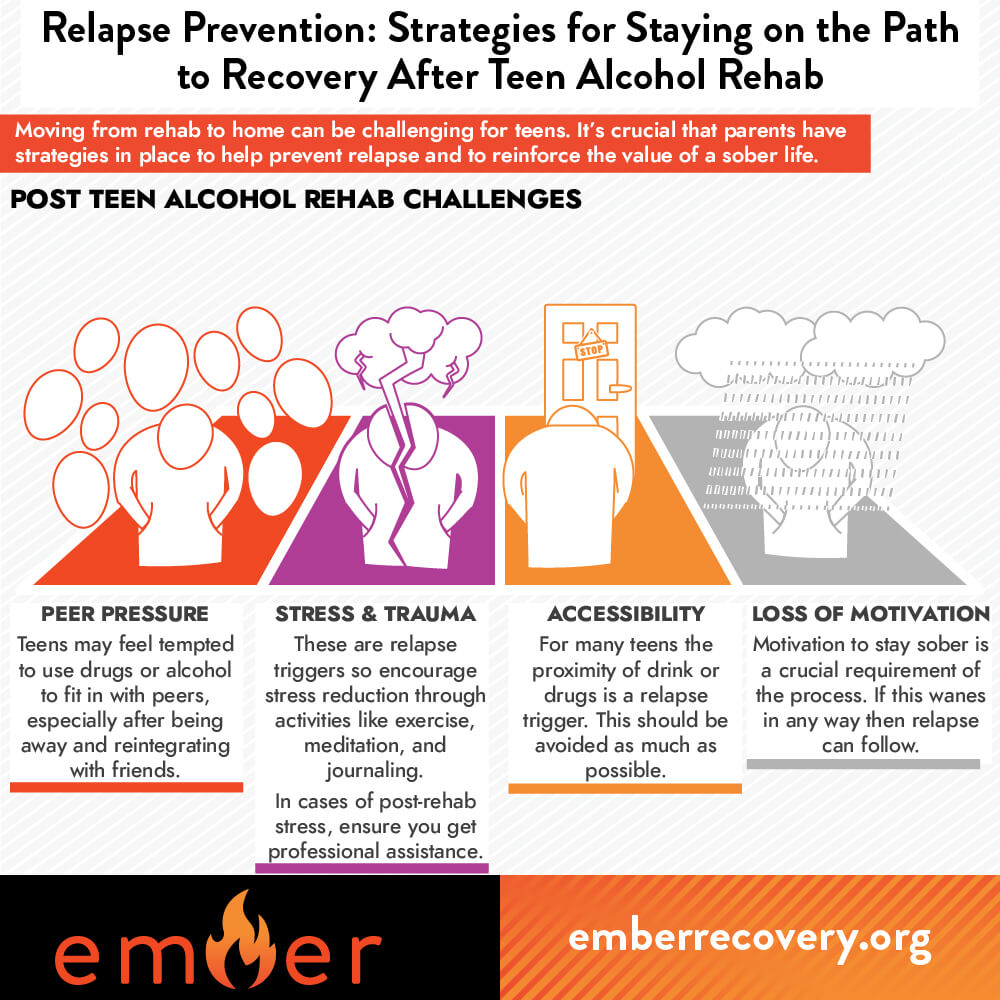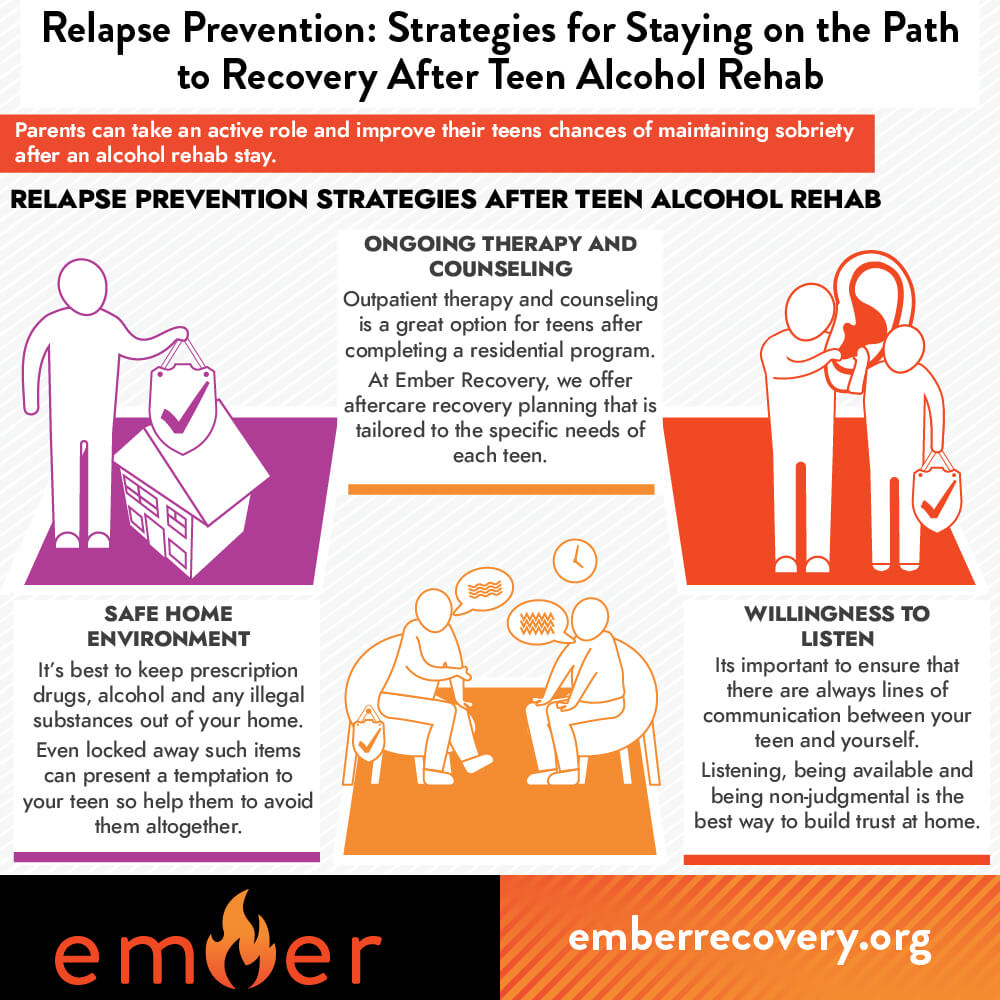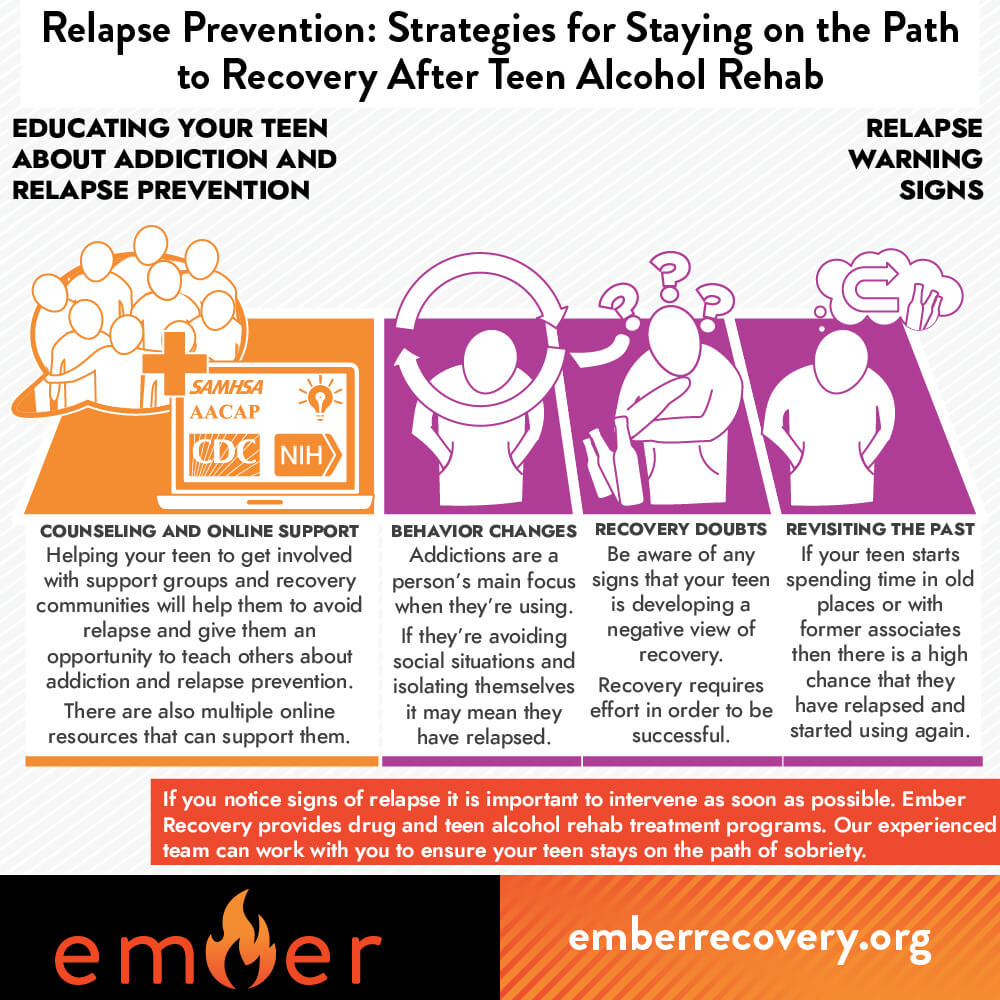Transitioning from teen alcohol rehab to home can be difficult, so parents must know strategies to help keep their teens on track. Equally as vital is recognizing the challenges your teen is facing as they try to adjust to life after rehab while still maintaining sobriety.
We will focus on those challenges and relapse prevention strategies and how you can educate your teen to understand addiction and relapse better. We’ll also explore the different treatment programs Ember Recovery offers to help treat your teen’s substance use disorder.
Post Teen Alcohol Rehab Challenges
When teens are in an inpatient addiction treatment program, they receive the help they need to stay sober 24/7. Once they return home, they face challenges they need to overcome to maintain their sobriety.
Here are some triggers and temptations that can lead to relapse:
Peer Pressure
If your teen spends time with kids who use drugs and alcohol, they may be tempted to do the same to fit in. This is especially true if they have been away for a while and are trying to reacclimate themselves with their peers.
Stress or Trauma
Stress or a traumatic event can be triggers for relapse. You can help your teen remain stress-free by exercising, meditating, or journaling to reduce stress.
If your teen experiences a traumatic event post-rehab, get them the professional help they need to prevent relapse.
Accessibility
Easy access to drugs or alcohol can be a significant challenge for sobriety. For many, just being around the substance is enough to trigger a relapse.
Loss of Motivation
One study found that lack of motivation and confidence can be predictors for relapse. 1 Without the want or desire to stay sober, a teen can quickly start using drugs or alcohol again.
Relapse Prevention Strategies After Teen Alcohol Rehab
As a parent, you can take an active role in helping your teen maintain their sobriety from their teen alcohol rehab stay.
Providing a Safe Home Environment for Your Teen After Teen Alcohol Rehab
Keeping alcohol, prescription drugs, and any illegal materials out of your home will provide a safe home environment, free of any temptation. If alcohol is in the house, even if it is locked up, your teen may still be tempted to take some.
Be Willing to Listen
Always let your teen know you are there to listen if a problem arises. Having an open door with a non-judgmental vibe is best. Keep the lines of communication open to build trust within the family.
Ongoing Therapy & Counseling
Many teens participate in outpatient therapy and counseling after leaving a residential program. This can provide them with the ongoing support they need to stay sober.
At Ember Recovery, we offer aftercare recovery planning that allows teens to figure out the best way to move forward after their residential program. For many, this includes:
- Continued Counseling
- Family Therapy
- Recovery Support Group
The post-rehab plan is tailored to each patient just as each residential treatment program is because each teen’s substance abuse disorder is different.
Educating Your Teen About Addiction and Relapse Prevention
Getting involved in support groups and recovery communities can help teens prevent relapse and educate others about addiction and relapse prevention.
For teens who have finished their treatment programs, getting involved in peer support groups can help them stay connected to the recovery process. They can still interact with teens who have gone through similar situations and provide the support network they need.
There are also ample resources and materials available online to help teens understand the nature of addiction and relapse. Here are some to consider:
- Substance Abuse and Mental Health Services Administration
- American Academy of Child & Adolescent Psychiatry
- Centers for Disease Control & Prevention
- National Institutes of Health
All of these resources can help to educate teens about drug and alcohol addiction as well as relapse prevention. Education is one of the best tools to help keep teens from the dangers of drugs and alcohol.
Relapse Warning Signs
Despite education efforts and prevention strategies, relapse does happen. Several things may indicate your teen is using drugs and alcohol again.
Behavioral Changes
Isolation and staying away from social situations are two behaviors that can signal relapse. When a teen is using drugs or alcohol, that becomes their primary focus. They have no desire to do anything else. They may also seek isolation if they feel guilty or embarrassed about using again.
Doubting the Recovery Process
Pay attention if your teen starts saying things like the sober life isn’t for them or that they don’t want to be sober. This is a red flag that they may be relapsing. When teens have a negative view of recovery, staying sober is no longer a priority.
Returning to People/Places That Lead to Their Addiction
When your teen starts to return to the people and/or places that made them use drugs or alcohol, there’s a good chance they’re back to their old habits.
If you notice these signs, you’ll want to intervene immediately and get your teen the help they need to stay sober. Teens can return to sobriety with the proper guidance, support system, and treatment plans.
Are You Looking for a Teen Alcohol Rehab in Iowa? Call Ember Recovery
Ember Recovery is here to provide drug and teen alcohol rehab treatment programs. We offer a wide variety of residential programs for teen boys and girls. Our programs are tailored to the individual while providing teens the home-like atmosphere they need to flourish in a rehab setting.
We also offer detox referrals as well as LGBTQIA+ inclusive addiction treatment and dual diagnosis care. Our team is experienced and equipped to treat your teen’s substance abuse disorder and help them stay on the path of sobriety.
Call Ember Recovery today to learn more about our teen alcohol rehab and drug treatment plans.
Sources:
[1] https://www.ncbi.nlm.nih.gov/pmc/articles/PMC4023909/

Andrea Dickerson is a Licensed Therapist and Certified Substance Use Counselor who has worked in behavioral health since 1997. Currently, Andrea is the Director of Behavioral Health, overseeing the Ember residential treatment programs and YSS outpatient counseling clinics throughout Central and North Central Iowa. She became a Motivational Interviewing (MI) trainer in 2006 and provides MI trainings throughout Iowa.
Andrea specializes in working with adolescents and their families and enjoys seeing the family relationships grow through therapy. Andrea is also a CARF International Surveyor, going around North America ensuring behavioral health organizations are meeting required standards.
In her free time, Andrea enjoys cheering on the Iowa Hawkeyes and Chicago Cubs, as well as being an active member of Soroptimist International of the Americas (SIA), a global organization that provides women and girls with access to the education and training they need to achieve economic empowerment. She has been a member of the SI of Des Moines club since 2012 and has been actively involved at the regional level, currently serving as Co-Governor of the Peaks to Plains Region.
Through her involvement in SIA, Andrea has been actively involved in the Dream Programs, coordinating annual Dream It, Be It: Career Support for Girls projects, which give girls the tools they need to achieve their education and career goals, empowering them to break cycles of poverty, violence, and abuse.



